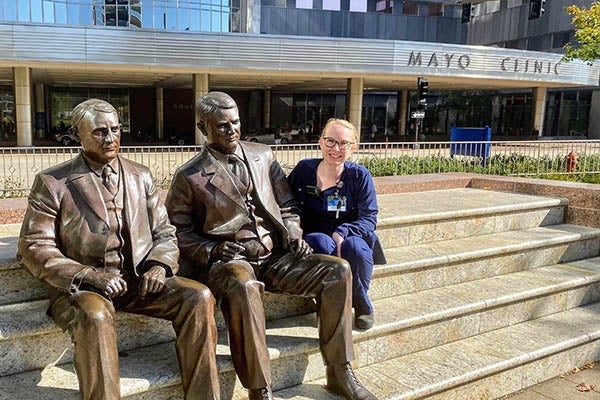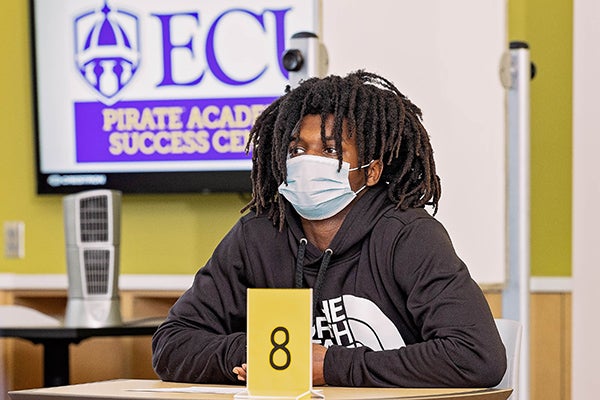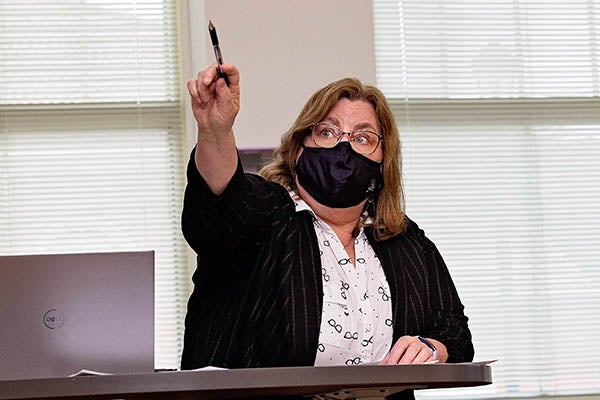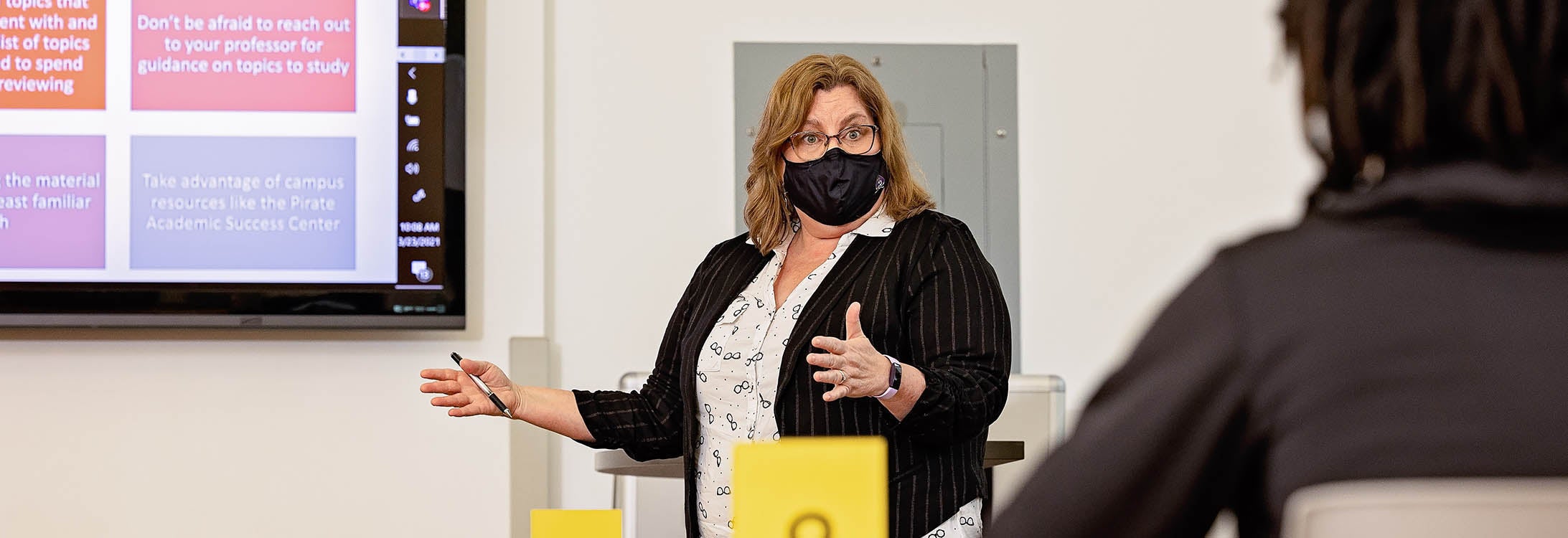INSPIRING SUCCESS
Students find support in Pirate Academic Success Center
When Jessie Drymon was an East Carolina University student, she tutored and learned at the Pirate Academic Success Center.
Now that she is a registered nurse caring for organ transplant patients at the Mayo Clinic in Minnesota, she draws on her PASC experiences on a daily basis.

Jessie Drymon, an organ transplant nurse, is shown outside the Mayo Clinic in Minnesota. She credits the Pirate Academic Success Center for helping her be successful at ECU and in her career. (Contributed photo)
“An important aspect of my job is education,” said Drymon, who graduated in 2019. “Teaching about anti-rejection medications — drug names, actions, side effects, etc. — activity restrictions post-surgery, cares for wounds or drains, ways to prevent infection, nutrition and diet changes and more, knowing different learning styles and how to adapt teaching has helped connect with patients to ensure they know their content.”
Drymon is part of the new PASC alumni advisory board that formed last year. The 12 members are involved in outreach activities and offer guidance to mentors and tutors at the center. A handful participated in a series of spring career night webinars in which they provided students the perspectives of younger alumni.
“It was so rewarding,” said Dr. Elizabeth Coghill, director of PASC. “We had over 200 ECU students participate in those sessions, and they asked great questions of the panel. It was just a really neat opportunity all the way around to see current ECU students with young professionals make those connections. It was still fresh enough for those young alumni. It’s really reflective of what we do at the center anyway, those peer-to-peer connections.”
The PASC started 14 years ago and offers students a variety of services including tutoring, study groups, study skills assistance, workshops and a mentoring program for freshmen. It is located in the Old Cafeteria Complex.
“We start with tutoring, but of course content is not the whole answer,” Coghill said. “I can come to tutoring every week, but if I’m not getting my assignments in and I’m not studying properly then it’s not going to have a big impact. When I combine the course content with the success coaching and understanding study strategies, that’s when everything works.”
Elementary education major Gianna Lanciani said the PASC helped her as she struggled to adjust to college life and college level courses.
“I had so many tutoring appointments my freshman and sophomore years,” she said.
She said those sessions helped her learn in a low-stress environment, and she began to flourish — so much so that she’s worked as a success mentor and assistant in the PASC for the last two years. Now, she’s set to graduate.
“The Pirate Academic Success Center helped me in more ways than I can even count,” she said. “I became a better student, learner, friend, college student and advocate. By being so involved with the center since my freshman year, I was able to learn how to navigate college in a way that would set me up for success. I learned how to be my own advocate in my learning and push myself to be the best student I can be. I truly wouldn’t be where I am today if it wasn’t for the center and the staff.”
Drymon worked as a math tutor in the center but quickly connected with other pre-nursing majors serving as tutors. They worked on classwork together, providing her a chance to get out of the center what she put in.
“I was being tutored as much as I tutored most weeks — just to reinforce the information that was taught in lecture,” Drymon said.
Her advice to students is to use the services PASC offers and to get to know their professors.

A student listens during a course at the Pirate Academic Success Center. (Photo by Cliff Hollis)
“Make a connection and then they will know who you are when you ask for help,” Drymon said. “Once you get to know your professor, reviewing old tests and assignments that you may have done poorly on will help the professor know ways to aid your learning as well.”
Those connections have been harder during the COVID-19 pandemic, but Coghill said PASC has been doing online and digital work with students since 2012, and is using different methods of communication to stay in touch with students.
“We were able to move to Teams very quickly and have been able to use that platform,” Coghill said. “We’ve always been a hands-on, hard-working team, and COVID makes us be very hands-on in connecting every day and making sure the welfare of the students is there.”
Coghill recently obtained lifetime certification from the National College Learning Center Association, an accrediting body for learning centers and professionals in the field. Criteria for qualification include years of service, doctoral degrees, national speaking engagements and published work.
Along with her husband, Coghill published a book, “Supporting Neurodiverse College Student Success,” in January that focuses on how students with learning challenges can navigate college. The subject relates to her son, a successful high school student who struggled in college with ADHD.

Dr. Elizabeth Coghill instructs students in the Pirate Academic Success Center. (Photo by Cliff Hollis)
“It’s been a journey over the last four years in getting him help and understanding the role learning difference makes in being able to go to college and succeed and graduate,” Coghill said. “I think when we’re faced with things sometimes in our personal life we have a choice of bringing it to our professional life and making a difference, and for me this has been most definitely that area. I’ve educated myself, learned a lot about students, and we do things differently at the PASC as a result of recognizing the students who come to our school with things like ADHD, ADD, dyslexia and other learning challenges, but with support, they can do well.”
Coghill said students with learning challenges are having success in high school, and now that must translate to colleges.
“They’re getting into our colleges at much higher numbers, but once they get to college, the support isn’t there. The structure isn’t there,” she said. “There are things we can do as faculty members to make the experience a successful one. That’s what we’re doing.”
Coghill is encouraging her staff members to get NCLCA certified and is hopeful the PASC can be nationally certified as well.
“We’re just a quiet group on campus,” she said. “My staff is small, but they do amazing work. They are amazing.”
And their whole goal is simply to help students succeed.
“We’ll see them through,” Coghill said. “This is a hard environment for students to learn in, but they can still learn. They just need a little extra support.”
